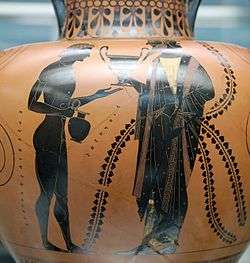Merope (Oenopion)
Merope (/ˈmɛrəpiː/; Greek: Μερόπη Meropê) was a mortal princess in Greek mythology, who was raped by hunter Orion and was his fiancée.[1]
Merope | |
|---|---|
| Princess of Chios | |
| Spouse(s) | Orion (fiancé) |
| Father | King Oenopion or King Minos |
| Mother | Helike |
- For more famous Merope, an aunt of god Hermes, see Merope (Pleiades).
She is called Haero by Parthenius of Nicaea.[2]
Family
Merope was a daughter of King Oenopion, who was a legendary ruler of Chios and son of Princess Ariadne. He was said to have brought winemaking to the island. Her mother was Helike.
She was a sister to Melas, Talus, Euanthes, Salagus and Athamas.[3]
Merope and Orion
The story of Oenopion’s daughter differs somewhat in different ancient sources. The Hunter Orion married a lovely woman called Side and when she was punished by Hera, he walked to Chios over the Aegean, and Oenopion welcomed him with a banquet.
Merope was beloved by Orion but he did not have an acceptance of Oenopion. Orion got drunk and assaulted Merope. In revenge, Oenopion stabbed out Orion’s eyes, and then threw him off the island.[4]
Theories
The story of Orion and Merope varies. One source refers to Merope as the wife of Oenopion and not his daughter. Another refers to Merope as the daughter of King Minos, who was a father of Merope’s grandmother.[5]
The Hungarian mythographer Károly Kerényi, one of the founders of the modern study of mythology, wrote about Merope in Gods of the Greeks. Kerényi portrays Orion as a giant born outside his mother.[6] He placed great stress on the variant in which Merope is the wife of Oenopion. He sees this as the remnant of a lost form of the myth in which Merope was Orion’s mother (converted by later generations to his stepmother).
In popular culture
The 2002 opera Galileo Galilei by American composer Philip Glass includes an opera within an opera piece between Orion and Merope.[7]
Asteroid 1051 Merope is named for her.
References
- Theoi Project: Orion
- Parthenius, Love Romances, 20
- Pausanias, Description of Greece, 7. 4. 8
- Smith. Dictionary of Greek and Roman Biography and Mythology. Archived from the original on 2010-11-18. Retrieved 2010-05-26.
- Kerenyi, Gods of the Greeks, pp. 201–204; for Merope as the wife of Oenopion, he cites the scholiast on Nicander, Theriaca 15. Frazer's notes to Apollodorus.
- Kerényi believes the story of Hyrieus to be original, and that the pun on Orion/ourion was made for the myth, rather than the other way around.
- Strini, Tom (Jun. 29, 2002). "'Galileo' journeys to the stars" Archived 2007-09-29 at the Wayback Machine. Milwaukee Journal Sentinel.
